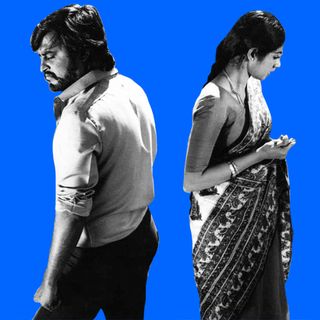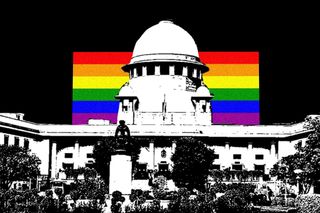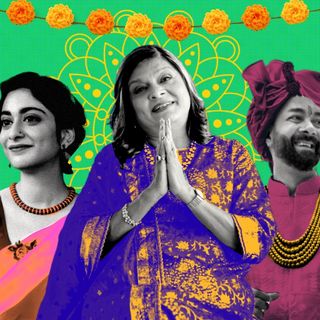
The Marriage Equality Hearings: Week 1
The Swaddle’s Hetvi Kamdar sat in on week 1’s hearings and asked petitioner Utkarsh Saxena a few questions about the salient points.

The ongoing Supreme Court hearings on same-sex marriage petitions mark the first significant case in the Indian judiciary that’s being live-streamed to the nation. With all eyes on the outcome of the case, on behalf of The Swaddle, Hetvi Kamdar sat in on week 1’s hearings and asked petitioner Utkarsh Saxena, who is also a lawyer on this case, a few questions about the salient points.
The Swaddle: Justice Chandrachud’s statements on sex and gender not being absolutes have been doing the rounds lately, which started conversations on the verbiage of “same-sex” marriages. Why did this terminology become the chosen one?
Utkarsh Saxena: As far as the terminology is concerned, we have been saying ‘marriage equality,’ not same-sex marriage – that’s been our pitch. So there were two portions to our petitions. The first was on marriage rights for everyone within the Special Marriage Act, and interpreting terms and clauses of the SMA in a way that is agnostic of gender or sexual orientation, primarily so that it’s not just about same sex but just the full spectrum that covers all people and all their situations. The other reason why we use marriage equality is because that’s just the marriage part of the litigation, that’s just giving people the rights to marry. The equality part of the litigation comes in when you take away the legal architecture that creates hurdles and barriers for people to access this institution and that’s where we’re challenging sections 5 through 10 of the Special Marriage Act, which is the notice and objection regime. The idea that to exercise your fundamental right you have to petition a district officer, and then they broadcast you in broad daylight and wide opposition from the entire world, is an extremely unequal process that allows only very few privileged people to access this institution. Especially in this context, vulnerable minorities are going to be compelled to come out to access the right to marry, which not only sounds extremely coercive, but also puts them in danger. One of the stories that was highlighted was Kajal’s, who is a petitioner, and who is actually in hiding and has sought protection from the Delhi High Court because she was concerned about her safety. I agree with you – I think the best terminology to describe this is marriage equality, because that’s just a broader and more inclusive term, than say, same-sex marriage.
TS: Why is the focus on marriage rather than recognizing civil unions for all?
Utkarsh Saxena: A civil union is typically a product of the legislature, where it creates some set of rights, so it’s a smaller set of rights for queer people to be able to live together and access some benefits. So it’s actually a smaller, more reduced, diluted category than marriage. The reason why we’re not talking about civil unions here is firstly because this is not coming through the legislature, this is not coming through the parliament, this is coming through the courts. And what the courts can only do is, it can ask the question saying look if a law exists already, can it selectively grant those rights to some and not to others? So in this case, those are marriage rights. And therefore our constitutional challenge is: can you selectively grant marriage rights to heterosexual couples and not to all the other couples who are seeking it? Therefore the court can’t really go into the question of civil unions, that has to come from the parliament. And the difference between the two is – if we are successful, we will get all the marriage rights that any other married couple gets, in society today so that ranges from adoption to inheritance, succession, taxes, bank accounts – the whole lot. When some other countries have defined civil unions, they have actually curtailed some rights. So they may not give you adoption rights, they’ll say look we’re happy with you coming together and we want to give some recognition to your relationship, but we won’t go the full distance. So why would we want a more diluted version of the set of rights, and why won’t we ask for the same set of rights that everyone else is getting in society.
TS: One interesting point in the hearing was the statement “public spaces are heteronormative.” Tell us what this has to do with recognizing same sex marriages.
Utkarsh Saxena: There are a few pillars that we are basing our arguments on, of which one is discrimination and equality, another is privacy and dignity. Another big part of it is the freedom of expression, and the Supreme Court has held that freedom of expression does not simply mean oral speech or written speech, it also means how you express yourself, and how you should have the freedom to express yourself. Your orientation and your relationships are a big part of that expression of yourself and society, and you should have that freedom. But unfortunately because public spaces are heteronormative, because marriage is defined in that context, we don’t have that freedom of speech. Unless we are granted these marriage rights, we actually can’t do full justice to our expressions in public spaces. So for them to not be heteronormative, for them to be inclusive, marriage rights are an important gateway.
TS: More than same sex marriages, the hearings are bringing out some deep seated prejudices against queer people in general, such as the questions around it being an urban elitist concept, as well as the opposition terming queer people as less than equal to their “heterosexual brethren,” what are the ramifications of publicising such discussions?
Utkarsh Saxena: That’s a good question. I do believe sunlight is the best disinfectant. People do hold these prejudices, and instead of having them marinate in their heads and strengthen, I think it’s best to bring them out. So, it’s unfortunate that queer people have to hear these things, it has to be triggering, it has to be traumatic, it directly pertains to their lived struggles and experiences, but I don’t know of a less painful way to do this, unfortunately, to have a social conversation. The second is that, I think actually sometimes it helps for them to say some of these things because they make themselves look silly. I mean, for someone to say that marriage equality is an elite and urban concept, firstly what part of it is urban – I didn’t understand that statement, to be very honest. Marriage is urban and elitist? Certainly not. Marriage is as central to Indian society, and as pervasive an institution as there can be. So what is the problem? Granting that to some people, and not to others? I would say that the fact that you’re choosing not to grant it to some people, and being exclusionary, is probably what’s elitist. So, this is not an elite concept, and the idea that a biological trait has something to do with geography and class, is such a strange argument to make, that I almost feel like it’s better for it to be made and called out, and for people to realise how that does not make a lot of sense, than to just let it marinate frankly.
Hetvi is an enthusiast of pop culture and all things literary. Her writing is at the convergence of gender, economics, technology and cultural criticism. You can find her at @hetviii.k.
Related


Reclaiming Cringe: Were Bangs Always Cool?
